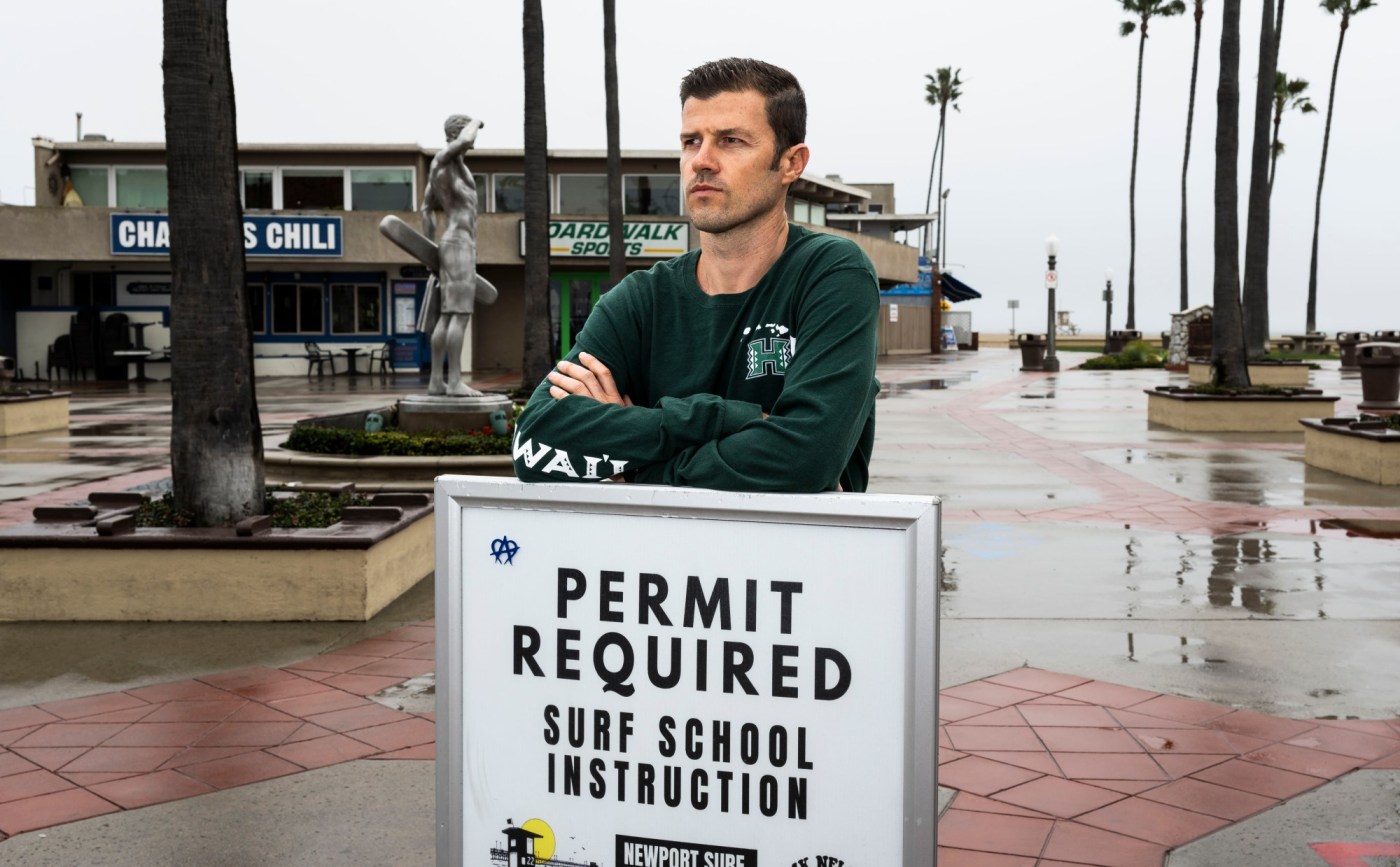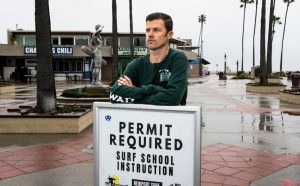
Lawsuit over who can open a SoCal surf school raises public space questions
NEWPORT BEACH, Calif. — Jason Murchison wants his office to be the beach, the ocean waves his classroom.
The longtime surf instructor filed a lawsuit in January against Newport Beach, arguing the town’s permitting system creates a monopoly in the city and he has no fair chance to start a surf school.
The city, in turn, says its process for selecting surf schools is similar to other recreational businesses that operate throughout the city, and a vetting process is needed to ensure that people pass background checks and other requirements before doing business in town.
The case raises questions about who can regulate areas considered public space, and who should have a say on what, and how many, businesses can operate on the beach.
Murchison grew up playing traditional ball sports in Fullerton, but at a young age found a connection with the ocean while surfing, a place where he could be at ease, he said.
He went to the University of Hawaii and in 2010 joined the Navy. Following his service, he returned to California to go to law school.
Needing a part-time job to help fund his education, he got a job giving surf lessons at Huntington State Beach.
Murchison felt out of place with the teenage instructors, he said, so he started his own operation, Learn to Surf. He got a business license and insurance, thinking that would be enough to get up and running.
He tried to get necessary permitting through State Parks, but “my check was never cashed and my permit was never issued.”
“They were vague and ambiguous about the process,” he said.
So he called the California Coastal Commission, asking what he was allowed to do. He was told, he said, that as long as he wasn’t erecting tents and structures, taking payments at the beach or blocking off areas of public access, he wasn’t violating state law.
But local officials thought otherwise. About a decade ago, as surfing’s popularity surged, rules got stiffer in many coastal jurisdictions against so-called “pirate” surf schools that were operating without a permit.
At one point, Murchison said he was put in the back of a State Parks squad car for an hour and half for giving a surf lesson.
He went to Newport Beach and tried to get a permit there, but was denied several times, always with the same response that the city already has enough surf schools along its 9-mile beach, he said.
Currently, three schools are allowed to operate in Newport Beach — one at the pier, another at 32nd Street and a third near the Santa Ana River mouth at Huntington Beach’s border.
“You can’t get a permit,” Murchison said. “There’s such a stranglehold by some of these companies that have been established.”
He kept giving lessons.
He advertised his surf school near the Balboa Pier in 2016, and a week later got a ticket in the mail for conducting a surf lesson.
“They would follow me around, any beach I went to I was stopped in Newport,” he said. “Even when I was surfing with a friend, they would accuse me of giving surf lessons.”
He said when he was giving stand-up paddleboarding lessons in the Newport Harbor he was subjected to a “sting operation,” a city employee taking video from a nearby boat, a code enforcement officer disguised as a customer, he said.
He was charged with two misdemeanors, charges later dropped, he said.
“There’s a lot of people who do this. I’m not the only guy giving surf lessons in Newport Beach that is not permitted through the city,” he said.
Murchison was taken to court by the city in 2017 and the judge ordered the city and Murchison to come to an agreement outside of the court. Murchison agreed to not give lessons within the city boundaries, or be subject to the city’s attorney fees.
He thought he found a loophole last year by giving lessons at the Santa Ana River, county-owned land wedged between Newport Beach and Huntington Beach.
“I found an area I thought didn’t have any rules or regulations,” he said.
One of his subcontractors drifted into Newport Beach’s waters – a violation of the agreement.
That prompted the city to give him a $19,000 bill for violating the original agreement, and another for $22,000 in January for legal fees to enforce the settlement, documents show.
“All because I want to teach people to surf and give people another option,” Murchison said.
He understands if surf schools are paying city fees for perks, like having storage sheds or preferred parking for clients, or for advertising through the city.
But there should be another option for those who want to give lessons on their own, a different tier system, he argues. He’s happy to pay a fee to the city or do whatever background checks are necessary, he said.
“I’ve never not wanted to get a permit,” he said. “In every area, I’ve wanted to do this legally.”
“There’s nowhere else to go,” he said. “I’ve been backed in the corner with all these legal bills and the prospect of a business that is being shut down.”
The city is reviewing the complaint, an email response said.
In general, the city has an “extensive recreation program that employs many private companies and individuals under contract to provide surfing and other lessons,” city officials said in a statement.
“Vendors must apply for these positions, be selected and vetted based on qualifications, pass insurance and criminal background checks and enter into a contract with the city,” officials said. “In the case of activities that have more contractor demand than available space, a (request for proposals) can be conducted, which is the case with surfing lessons.”
By enforcing provisions, the city governs how public resources – in this case, public beaches – are used by private companies for the benefit of the public, officials added in their statement.
City spokesman John Pope said there is a need to regulate people teaching in the city, whether at the beach or parks or any other city-operated area.
In some cases, it’s a simple application, in other instances, there is a proposal process, interview process and background checks.
About four years ago, the city went through the request for proposals process and picked three surf schools, Pope said.
The number of people giving lessons needs to be regulated, or surf schools could theoretically set up shop up and down the coast and take the best spots, Pope said.
“It’s something that has to be regulated as part of our stewardship of public land,” he added.
The city also has to consider public access concerns with schools bringing in groups, competing for space with regular beachgoers who want to surf or be in the ocean, he said.
Related Articles
Antisemitism fears are causing many Jewish Americans to change behavior, survey shows
Autopsy: OpenAI whistleblower Suchir Balaji died of suicide
Colorado town taps AI to plug underground water leaks — and prevent the loss of millions of gallons
Is Presidents Day the most confusing holiday in the US?
Here are some takeaways from the first month of Trump’s Mideast diplomacy
“If someone wants to teach for free, there’s nothing wrong with getting people together. As soon as you start charging for it and saying you’re part of the city, that’s where the problems come in,” Pope said. “It is competitive and we’re going to select the best and most qualified to set up shop.”
Caleb Trotter, senior attorney for Pacific Legal Foundation representing Murchison, argues that it is unconstitutional and unlawful for the city to restrict Murchison from instructing others on how to surf and the city is favoring some beach activities over others. A person playing guitar for tips on the sand, for example, doesn’t have to adhere to the same rules.
January’s lawsuit wouldn’t address Murchison’s previous squabble with the city and they will have to figure that separately, Trotter added.
The city is monopolizing surf instruction and California’s Coastal Act does not permit the city to restrict access to the coast without a Coastal Development Permit, Trotter argues. The city’s ordinance doesn’t spell out how to get an agreement or who can get one to teach, he said.
“They’ve essentially monopolized paid surf instruction in Newport Beach,” he said, “and banned everybody else from earning a living that way in the city.”
If Trotter’s argument does hold up in court, it could have an impact on how all beaches are managed by their local jurisdictions.
At least 13 providers have sought to obtain an agreement with Newport Beach to teach paid surfing and SUP lessons on city beaches since 2012, according to the lawsuit.
As part of the city’s agreements with approved instructors, it receives 20% to 30% of the fees paid for surfing and stand-up paddleboarding lessons. The city posts signs near the beach stating “permit required” for surf school instruction, with citation to the ordinance provided and a statement that violators “may be cited.”
“This case raises some interesting legal issues regarding public versus private use of ocean waves,” the Coastal Commission said in a statement. “The commission is not a party to the litigation, but will be following it closely.”


